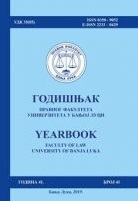PSYCHOLOGICAL ASPECTS OF THE MIGRANT CRISIS IN BOSNIA AND HERZEGOVINA
DOI:
https://doi.org/10.7251/GOD1941175KAbstract
The migrant crisis is a reality that inevitably permeates the societyof Bosnia and Herzegovina, and which requires an adequate systemic response.
A large number of financial resources that are globally allocated for
the protection of migrants provide the possibility to alleviate the consequences
that the movement of the population is caused by the fear of one’s own life. Migration
can have different implications- social, psychological, economic and
cultural, as well as two-fold impact: the impact on migrants and the impact of
migrants on the society they come in. As a social process, migrations change
not only the geographical image of a particular community, but also significantly
affect the personality of migrants who, due to the crisis, can be further
desecrated and deprived. The migrant crisis that has escalated in the region in
2015, in Bosnia and Herzegovina is currently a status quo. Numerous experts
warn that the sluggishness and the resolution of the current problems that the
migrant crisis brings with them can have far-reaching consequences. The issue
of security is one of the key issues and challenges in accordance with which the
strategic direction of each country’s development is directed, as well as the issue
of its internal and external policies.
Bearing in mind the fact that the society of Bosnia and Herzegovina faces a
full-scale migration crisis, it is necessary to define the approach, mechanisms
and directions of action that unify the needs of migrants, but also the needs and
interests of the country. The subject of this Paper covers a migrant crisis that
is taking place in region and Bosnia and Herzegovina, and the aim is to point
out the psychological aspects that it has or can have on migrants, but also on
the domicile population. Although migration policy is a broad concept, this Pa-
per will point to the essential implication, that is, the personality of migrants -
children, youth and elderly people who, in addition to stress, marginalization,
home distance and the variety of cultures - face daily with the uncertainty of
their own existence.
Downloads
Published
2019-12-25
Issue
Section
Чланци
